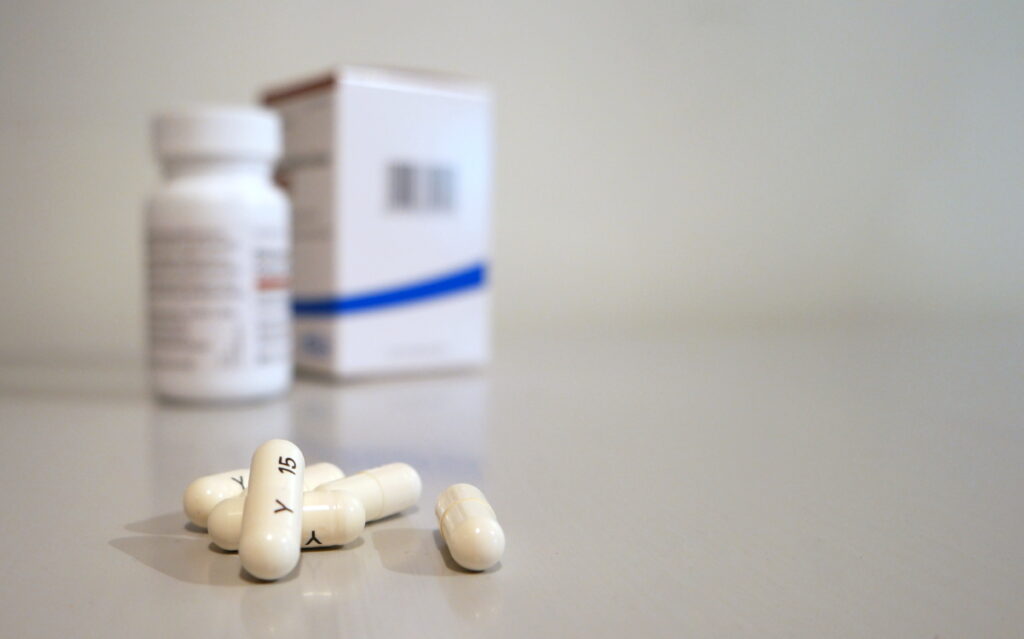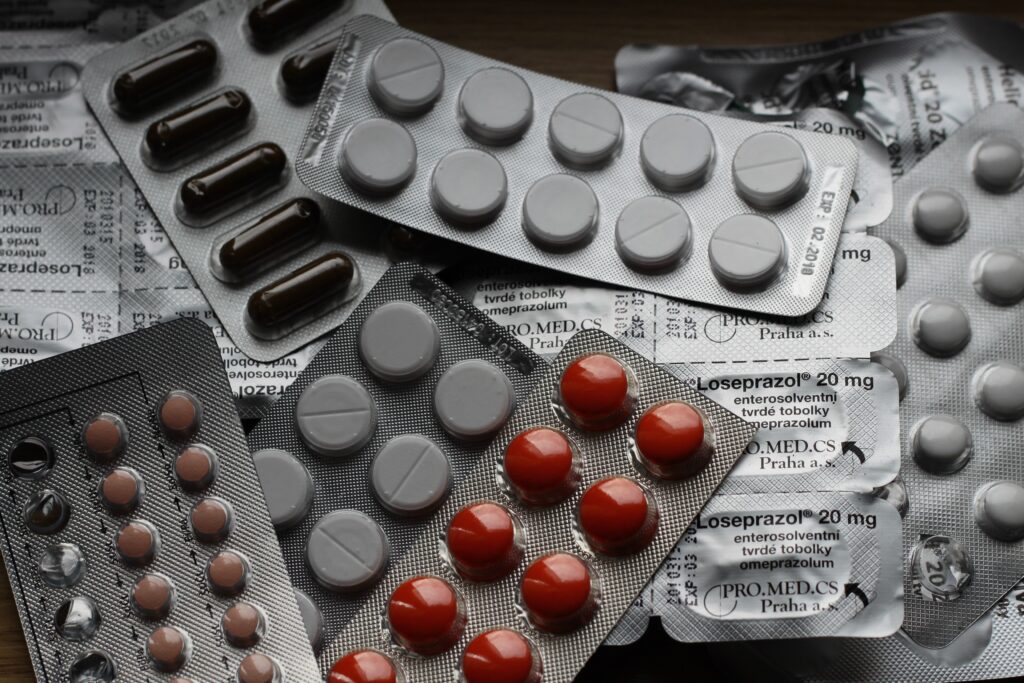The FDA approves medications for treating Alcohol Use Disorder (AUD). Science supports their use. Medication can help with withdrawal, cravings, and relapse. It works best with therapy and support groups.
Here are some FDA-approved medications for AUD:
- Acamprosate: This helps reduce long-term withdrawal symptoms such as insomnia, anxiety, and restlessness. It also lowers the risks of relapse. It works best for those who have stopped drinking and are trying to stay sober.
- Disulfiram: This makes the person feel sick and dizzy when they drink. This deters them from drinking and they begin to link alcohol with bad feelings and consequences.
- Naltrexone: Helps reduce the pleasure of drinking alcohol, lowering the urge. Also helps manage cravings and reduce the risk of relapse.
- Topiramate: Helps reduce withdrawal severity and the risk of relapse. It’s often used in addition to other therapies for those dealing with both alcohol and substance abuse/dependence.
- Gabapentin: Gabapentin is a medication that can help treat alcohol use disorder (AUD). It works by impacting the GABA neurotransmitters in the brain, making you feel more relaxed and less anxious.
- Baclofen: Baclofen has the potential to treat alcohol use disorder. Its action involves GABA receptors in the brain, which are important for addiction.
1. Disulfiram
Disulfiram is a med to help those with alcohol use disorder (AUD) to be sober. It blocks an enzyme which breaks down alcohol in the body. This leads to a buildup of acetaldehyde, causing yucky reactions if alcohol is consumed.
It must only be taken with medical supervision. It is not a cure for AUD – but it helps create an unpleasant connection with drinking alcohol.
Studies show Disulfiram can be helpful for some with AUD, when used with counseling and support groups. But, be aware of side effects and contraindications before starting treatment. Talk to a healthcare professional to see if Disulfiram is right for you or your loved one dealing with AUD.
2. Naltrexone
Naltrexone is a medication utilized for treating alcohol use disorder (AUD). It helps reduce cravings and the chances of a relapse. It works by blocking the opioid receptors in the brain, which stops the pleasant sensations from drinking.
Naltrexone can be taken orally or injected. It is usually prescribed along with counseling and behavioral therapies. Studies demonstrate that naltrexone can lessen the amount and intensity of alcohol cravings, especially in those with a family history of alcohol dependence.
However, naltrexone is not effective for everyone. It is not suitable for people with acute liver disease or those who are still drinking regularly. Therefore, it is essential to speak to a healthcare professional to determine if naltrexone is the right treatment for you.
3. Acamprosate
Acamprosate is a medication that assists in treating alcohol use disorder. It works by restoring the balance of certain brain neurotransmitters disrupted by alcohol use. This drug has been seen to reduce cravings and boost the chances of staying sober.
Studies prove that acamprosate can be safely taken with other treatments for alcohol use disorder, such as psychotherapy and support groups. This medication is mostly prescribed for those already not drinking alcohol and determined to remain sober.
It’s essential to note that acamprosate is not a cure, merely a tool to manage the disorder. Like any other medication, there are possible side effects, so it should only be taken with a qualified healthcare professional’s guidance.
4. Topiramate
Topiramate is an FDA-approved drug. It can help people with Alcohol Use Disorder (AUD). It reduces heavy drinking days and helps some folks reach abstinence.
Topiramate works by blocking certain brain receptors. These are linked to the “mood,” “reward,” and “pleasure” of drinking alcohol. It can also reduce cravings, ease withdrawal symptoms, and prevent relapse.
Studies show that topiramate is most useful when taken daily. This should be done with a low-dose, under healthcare professional guidance.
Common side effects are dizziness, drowsiness, and nausea. They usually go away after a few weeks of using topiramate. But only a healthcare professional can know about its potential risks.
5. Gabapentin
Gabapentin is a medication that can help treat alcohol use disorder (AUD). It works by impacting the GABA neurotransmitters in the brain, making you feel more relaxed and less anxious.
Several studies have been done on how well Gabapentin works for AUD. Most outcomes were positive, with users reporting fewer cravings and milder withdrawal symptoms.
However, it’s important to remember that Gabapentin isn’t for everyone. You should still talk to your healthcare provider about it. And therapy and counseling are critical for addressing the underlying causes of AUD.
6. Baclofen
Baclofen has potential to treat alcohol use disorder. Its action involves GABA receptors in the brain, which are important for addiction. It may reduce cravings and withdrawal symptoms. Some trials suggest it can reduce drinking days and increase periods of abstinence.
However, it has side effects, like drowsiness, dizziness, and nausea. People with kidney disease need dose adjustments or more monitoring when taking Baclofen. Consult a healthcare professional before beginning any medication for alcohol use disorder.
Efficacy of Medications to Treat AUD
Are you or a loved one struggling with alcohol use disorder (AUD)? There are medications to help. Disulfiram, naltrexone, and acamprosate are three commonly used.
- Disulfiram causes nausea, vomiting, and headaches if alcohol is consumed.
- Naltrexone takes the pleasure out of alcohol and lowers cravings.
- Acamprosate helps reduce withdrawal symptoms and balances brain chemicals.
Medication is not a cure. It should be combined with counseling and other forms of support. Speak to a healthcare professional to find the best approach.
Off-Label Medications for Treating AUD
Certain medications, although not approved for treating alcohol use disorder (AUD), can be effective when used ‘off-label’. These meds can be used with therapy and support groups.
Naltrexone is one such medication. It reduces cravings for alcohol and helps patients to abstain. It works by blocking the pleasurable effects of alcohol in the brain and thus reducing the risk of relapse.
Acamprosate is another medication that can help restore the brain’s chemical balance and lessen alcohol withdrawal symptoms. It does this by controlling chemicals altered by long-term alcohol abuse.
Topiramate, generally used to treat epilepsy and migraines, has been shown to reduce heavy drinking and boost abstinence in AUD patients. It works by changing brain activity and lowering the pleasurable effects of alcohol.
When using off-label medications for AUD, it’s important to consult a medical professional to determine the best approach for your needs.
Criteria for Evaluating the Efficacy of Medications
Evaluating medications for treating alcohol use disorder is essential. Here are criteria for evaluating the efficacy of meds:
- Can lower alcohol cravings and consumption.
- Improves physical and mental health issues caused by alcohol abuse.
- No adverse side effects that outweigh benefits.
- Impact on patient’s quality of life, such as in relationships and career.
- Long-term effectiveness in reducing relapse rates and promoting sustained recovery.
These criteria help healthcare providers and patients to choose the best medication for alcohol use disorder with the best results.

Integrating Medication Into an AUD Treatment Plan
For an individualized AUD treatment plan, a healthcare provider must assess the person’s medical history, drinking behavior, and comorbid conditions. Medication can help manage symptoms, lessen cravings, and prevent relapse in combination with therapy and support groups.
The FDA has approved three medications for AUD: naltrexone, acamprosate, and disulfiram.
- Naltrexone blocks brain reward pathways, making alcohol less enjoyable.
- Acamprosate balances brain chemicals that were altered due to heavy drinking, and reduces withdrawal and cravings.
- Disulfiram causes a nasty reaction when alcohol is consumed, like nausea, vomiting, and flushing, which can discourage relapse.
Before using medication, it’s important to consult a healthcare provider. Medication isn’t enough to conquer AUD. An integrated treatment plan contains medication, behavior therapies, support groups, and lifestyle changes.
Safety and Side Effects of AUD Medications
Treating Alcohol Use Disorder (AUD) can involve medication. It’s important to know the benefits and side effects.
Most AUD meds lower the pleasure from alcohol or cause an unpleasant feeling when consumed. They have been effective, but can cause nausea, sedation and digestive issues.
Discussing AUD meds with a doctor can help decide if it’s the right choice. Weigh the potential side effects with the benefits, such as reduced cravings and improved mental health.
Seeking help for AUD is essential. Talking to a doctor can be the first step to finding the right treatment plan.

Medication Initiation and Duration
Medication for Alcohol Use Disorder (AUD) involves managing withdrawal symptoms, reducing cravings, and preventing relapse.
Benzodiazepines, such as diazepam, are used to reduce symptoms like anxiety, insomnia, and seizures. Yet, they can be habit-forming, and have a high risk of abuse. So, they must be used carefully and with close medical supervision.
Naltrexone is an alternative medication. It blocks the pleasurable effects of alcohol in the brain and helps to reduce cravings and prevent relapse. It is available as a daily pill or a monthly injection.
The duration of medication treatment for AUD differs for each individual. Benzodiazepines are usually short-term, for a few days to a week. Naltrexone treatment could last months or years. A healthcare professional must be consulted to determine the right medication initiation and duration for your particular needs.
Sex Differences in AUD and Response to AUD Pharmacotherapies
AUD occurs more often in men than women. But women develop AUD faster and with less alcohol. Meds used to treat AUD can reduce cravings and prevent relapse. Yet, men and women react differently to these meds. For example, naltrexone cuts the pleasure of drinking. It tends to work better in men than women. Acamprosate, which helps with withdrawal symptoms, is more effective in women than men. So, sex-specific treatments may be needed to treat AUD.
Pharmacogenetic and Pharmacometabolomic Predictors of Response
Pharmacogenetics and pharmacometabolomics are personalized approaches to treating alcohol use disorder (AUD).
Genetic testing studies how genetic variations influence a person’s reaction to medication. DNA testing can reveal if a certain medication is suitable for that individual.
Pharmacometabolomics examines the metabolism of an individual and its effect on medication. This info can show if the person processes meds faster or slower than the average.
Combining these methods helps to identify tailored, effective treatments for AUD. For instance, genetic testing may detect adverse effects from a certain medication. Thus, another med may be more suitable. By using pharmacogenetic and pharmacometabolomic predictors, healthcare providers guide patients towards personalized medication-based treatments for AUD.
Concluding Remarks and Future Directions
In conclusion, the scientific community agrees medication is a must to treat Alcohol Use Disorder (AUD). FDA-approved drugs like naltrexone, acamprosate, and disulfiram have proven effective. There is also research on new meds that target different aspects of the addiction cycle.
Many studies suggest combining meds and therapy gives a higher success rate. Research should investigate long-term effects and optimal durations of med-assisted treatments.
It’s crucial to keep exploring the potential of medication for treating AUD. Discovering new medicines and developing innovative treatments can provide hope and save lives of those affected by this condition.

Five Facts About The Science Behind Using Medication To Help Treat Alcohol Use Disorder:
- ✅ Medications can be used to help reduce alcohol cravings and promote abstinence in individuals with alcohol use disorder. (Source: National Institute on Alcohol Abuse and Alcoholism)
- ✅ Medications such as naltrexone, acamprosate, and disulfiram are commonly used to treat alcohol use disorder. (Source: Mayo Clinic)
- ✅ Medications for alcohol use disorder are most effective when used in combination with behavioral therapies and support groups. (Source: Substance Abuse and Mental Health Services Administration)
- ✅ Naltrexone works by blocking the effects of alcohol in the brain and reducing the rewarding effects of drinking. (Source: National Institute on Alcohol Abuse and Alcoholism)
- ✅ Acamprosate helps reduce cravings and withdrawal symptoms by normalizing brain activity that has been disrupted by chronic alcohol use. (Source: Harvard Health Publishing)
FAQs about The Science Behind Using Medication To Help Treat Alcohol Use Disorder
How does medication help treat alcohol use disorder?
Medications used to treat alcohol use disorder work by reducing cravings, decreasing the pleasurable effects of alcohol, and managing withdrawal symptoms. They target specific brain chemicals and receptors that are involved in alcohol addiction.
What are the different types of medications used to treat alcohol use disorder?
There are three main types of medications used to treat alcohol use disorder: Acamprosate, Disulfiram, and Naltrexone. Acamprosate reduces cravings and withdrawal symptoms. Disulfiram makes the patient sick if he/she drinks alcohol. Naltrexone blocks the effects of alcohol and reduces cravings.
Are medications for alcohol use disorder safe?
Yes, medications used to treat alcohol use disorder are generally safe when taken as directed by a doctor. However, like all medications, they can have side effects. Patients should discuss any concerns with their healthcare provider and report any side effects immediately.
When should medication be used to treat alcohol use disorder?
In general, medication should be used in combination with behavioral therapy and other support services for the best results. Your healthcare provider can help determine if medication is appropriate for you based on your individual circumstances and medical history.
How long does it take for medication to have an effect?
The timeline for medication effectiveness varies depending on the individual and the medication being used. However, patients should not expect an immediate cure for alcohol use disorder. They should be prepared to take the medication for an extended period and engage in ongoing therapy and support services.
Can medication completely cure alcohol use disorder?
If you are looking to just quit drinking, medication can be an effective tool in treating alcohol use disorder, it is not a cure. Long-term success often relies on a combination of medication, therapy, and lifestyle changes. It’s important for patients to remain committed to their treatment plan even after they have stopped taking medication.